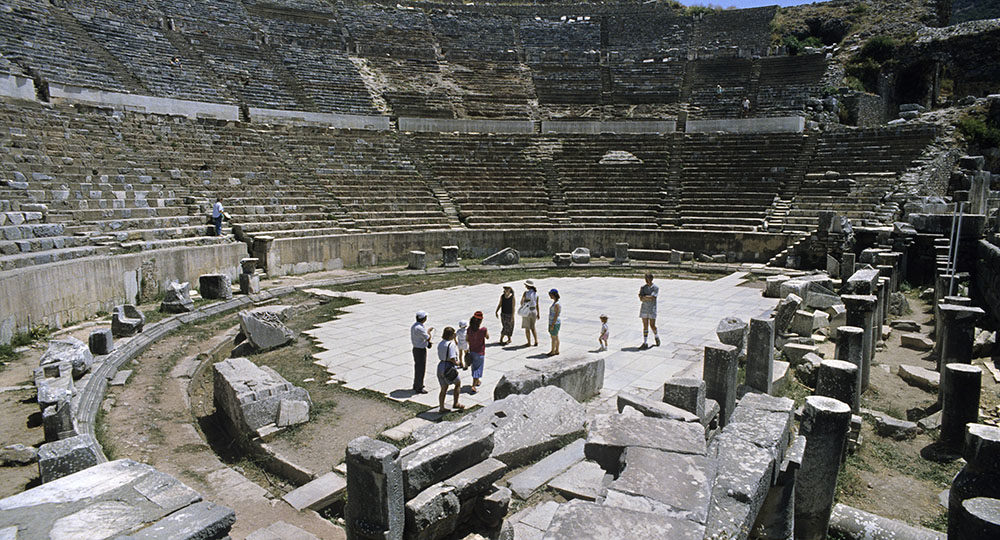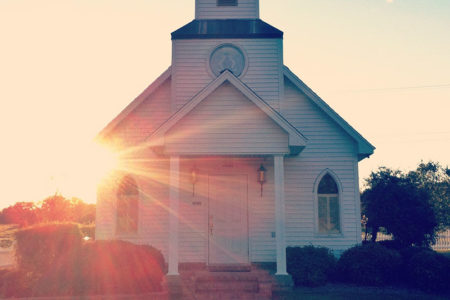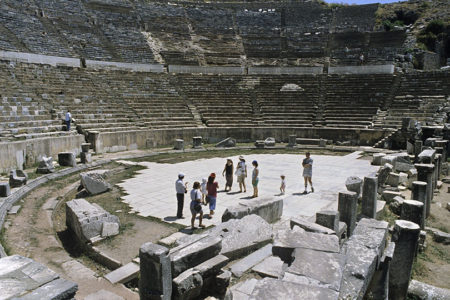Ephesus: Serving Without Love Revelation 2:1–7
Ephesus was one of the oldest and largest cities in Asia. This stately municipality was impressive, with its civic and commercial agora, its temples, gymnasiums, public baths, huge library, and a theater that seated 24,000. Politically, it was a free city and was home to the Roman governor of the province.
Located on the Cayster River, three miles from the Aegean Sea, Ephesus was a major harbor where ships could unload their cargo. Caravan routes from cities in the north, south, and east converged in Ephesus, making it a leading commercial center and a place of opulence and wealth.
Paul founded the church at Ephesus on his second missionary journey, around A.D. 53. He returned to the city on his third missionary journey and spent three years preaching and teaching in the synagogue and in the hall of Tyrannus. Ephesus became a missionary center from which all of Asia heard the gospel (Acts 19:8–10).
In Revelation 2:1, Christ addressed His letter to “the angel [literally, “messenger”] of the church of Ephesus.” The word angel most likely refers to a human messenger (not a supernatural angel, as some commentators believe) who was the elder, or pastor, of the Ephesian church. Christ is seen holding the “seven stars [churches] in His right hand,” symbolizing His authority and power. Christ protected, controlled, and cared for both the church and its pastors, whom He held accountable. Thus the Lord was mindful of their spiritual condition, for He walked “in the midst of the seven golden lampstands [churches].”
Commendation. The Lord gave a glowing commendation to the church at Ephesus. He said, “I know your works, your labor, your patience, and that you cannot bear those who are evil” (v. 2); that is, He had complete knowledge of all things concerning it. He knew the church’s service, that it labored until it was totally exhausted—physically, mentally, and emotionally. He knew its steadfastness, that this body of believers had patience and persevered while suffering persecution and privation.
He knew of its separation, that it stood against “those who are evil” (v. 2). The Ephesian Christians possessed discernment and discipline, enabling them to detect those living in sin. He knew their standards. They “tested those who say they are apostles and are not” (v. 2). They were able to spot deceivers in sheep’s clothing and remove them from the flock.
They also stood against a formidable sect called the Nicolaitans (v. 6). Nicolaitans professed faith in Christ but taught antinomianism (freedom to live without moral law) and practiced licentious living in the name of Christian liberty.
Christ acknowledged the Ephesians’ stamina in service. This body held up under opposition and did not grow weary during its exhaustive service, all for the sake of Christ’s name (v. 3).
Condemnation. Abruptly, however, the Lord changed His tone: “Nevertheless I have this against you, that you have left your first love” (v. 4). Notice that they did not lose but had left (forsook) their first love of the Lord. The Ephesians once had an agape (spiritual, selfless) love for Christ, but their devotion had severely eroded. When love for Christ cools, labor done in His name can become self-centered and lead to compromise and spiritual corruption. The Ephesian Christians now carried on out of duty, not love. God had their heads and hands—but not their hearts.
Counsel. So the Lord gave the church four admonitions concerning its condition:
- “Remember therefore from where you have fallen” (v. 5). The Ephesians were to recall their past commitments, reevaluate their present compromises, and refocus on love for Him. Love can be rekindled by taking to heart the counsel of Scripture and cultivating a close communion with the Lord.
- They were to “repent” (v. 5). Repentance is a genuine change of mind about one’s spiritual condition. It involves turning away from sin, experiencing contrition of heart, confessing sin, and committing to live a godly life before the Lord.
- They were to repeat their “first works” (v. 5) and serve Christ with a burning heart of love. All members were called on to revive the original commitments they had made out of love for Christ at the time of their conversions.
- Refusal to repent would result in their removal: “Or else I will come to you quickly and remove your lampstand from its place” (v. 5). Loveless churches eventually lose their ability to shine in a lost world.
Compensation. The Lord promised compensation to the overcomer: “To him who overcomes I will give to eat from the tree of life, which is in the midst of the Paradise of God” (v. 7). The word overcomer does not refer to Christians who have gained some spiritual victory in life, but rather to those who have accepted Christ as Savior (cf. 1 Jn. 5:4–5). True believers are assured of eternal life; they will eat from “the tree of life” that was first mentioned in the Garden of Eden (Gen. 2:9) and is now in heaven.
The path back to loving Christ is not difficult. Remember your past commitment and rekindle your first love for Him. Repent of your compromise and coldheartedness. Repeat your first works of serving Christ out of a devoted heart of love. And remember that if you refuse to be restored, Christ may remove your church or service, as He did the Ephesians’ in the fifth century.
“He who has an ear, let him hear what the Spirit says to the churches” (v. 7). Christians and churches in every age are to respond to Christ’s message. Are we listening?







